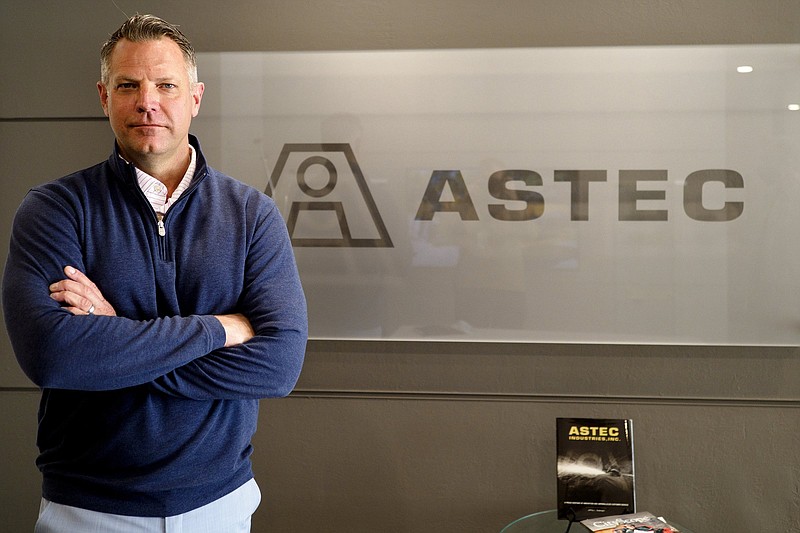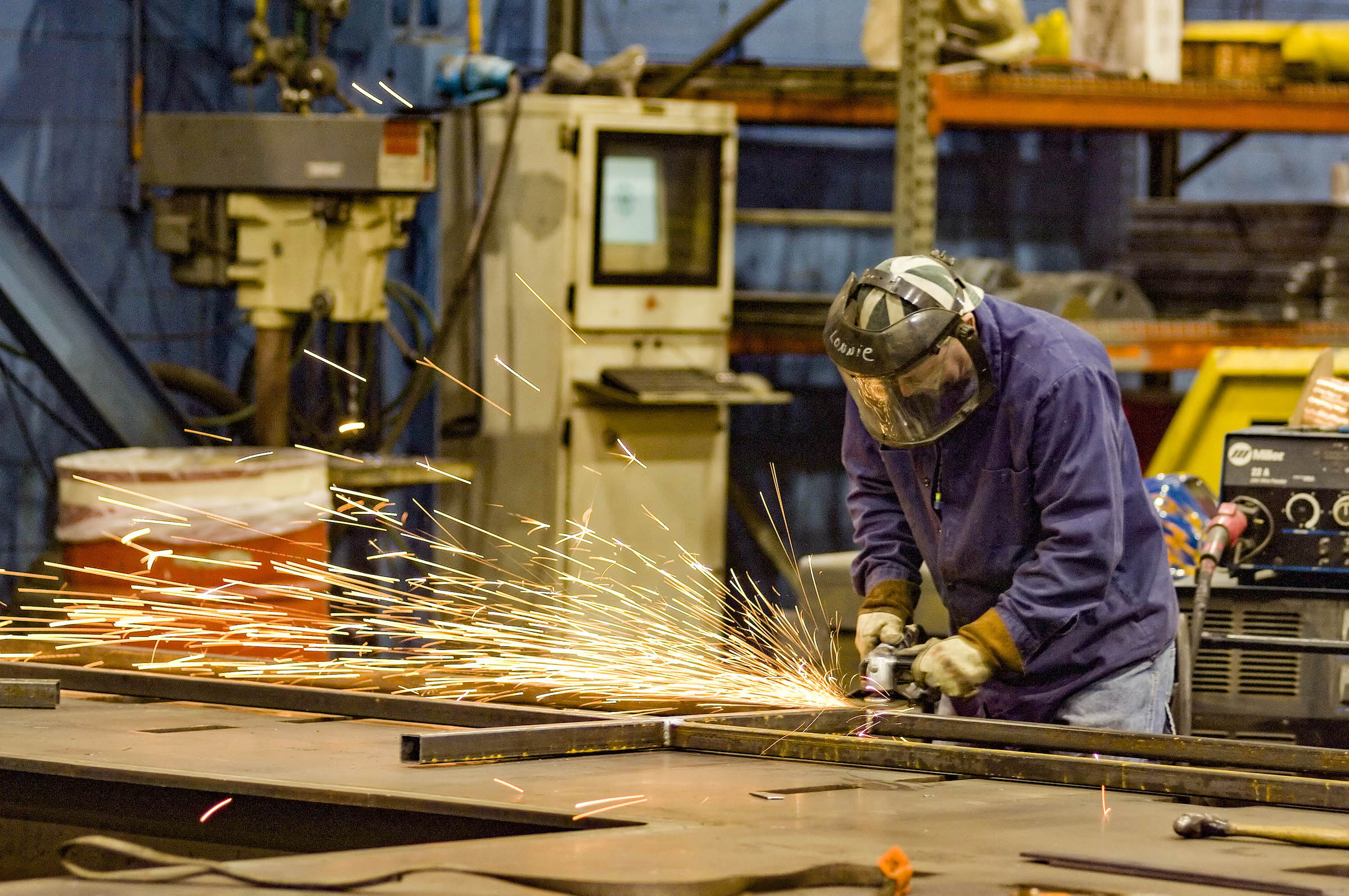As President Biden pushes his plan for a $2 trillion infrastructure package, a Chattanooga road-building equipment maker stands to be among the biggest beneficiaries if the plan is adopted.
Astec Industries Inc., one of the world's biggest manufacturers of asphalt, concrete and milling plants and equipment used by road builders, was one of 15 publicly traded companies that the financial magazine Barron's said last week will benefit the most from the White House proposal. The extra $115 billion proposed to be spent on fixing roads and bridges is projected to fix or expand over 20,000 miles of highways and roads and Astec makes much of the equipment road builders may need for the record levels of highway spending.
But even before the massive record road-building plan is considered, Astec Industries has been working to strengthen its own "Rock to Road" businesses under a new strategy developed over the past year and a half by CEO Barry Ruffalo.
Ruffalo, a 51-year-old former executive at both Valmont Industries and the Lindsay Corp, was hired to head Astec in August 2019 and has quickly developed a strategy to "simplify, focus and grow" Astec's global business.
For all of Astec's success under the leadership of company founder Don Brock and his son Ben during the company's first 44 years, Ruffalo said when he came to Astec he discovered 16 different companies and brands that weren't always working together as well as they could. After meeting with hundreds of Astec employees and customers in his first few months of the job, Ruffalo said he heard the overall business was often perceived as too complex and disjointed.
"We have great people and world-class products with a strong safety record, but our employees thought we were too complex in our organization and we could do a better job with communicating generally and aligning their work to Astec as a company," Ruffalo said. "Astec really operated as a holding company with 16 independent brands."
Astec, which was started by former University of Tennessee at Chattanooga engineering professor Don Brock in 1972, has developed an array of road building, mining and construction equipment over the past half century to grow into a billion-dollar-plus business with more than two dozen plants and sales offices around the globe. To both streamline and grow the business, Ruffalo developed a strategy to simplify and focus Astec on everything related to "Rock to Road."
"We decided to reduce the complexity of the structure of our organization and make it easier for customers, employees and shareholders to understand," he said. "We needed to focus on the things that add value and stop doing the things that don't."
In late 2019, Ruffalo introduced the OneASTEC business model, which codified how the business would operate and focus on its key business lines. Integrating the businesses owned by Astec should help improve customer service and relationships with a more unified and focused sales approach to meeting customer needs, Ruffalo said.
"We've really restructured the company around a group of products for the markets that we serve," he said. "We've built this company on being able to serve our customers with innovative products and having the best service and now we're able to do that more effectively."
In making distribution and customer service simpler, Astec also is focusing on all that is related to road building for its growth. The company exited most of its wood pellet production business just before Ruffalo arrived and last year Astec sold GEFCO, a producer of drilling equipment for water wells, to Bauer Equipment America.
But Ruffalo says there is plenty of opportunities for growth in supplying the road materials and building industry and with a strong balance sheet Astec is poised to make more acquisitions. Last August, Astec bought two full-line concrete batch plant manufacturers - the Nebraska-based Concrete Equipment and Canadian-based BMH Systems - to help expand its concrete plant offerings.
"We still have gaps in our "road to rock" approach and where we see opportunities in those gaps we will look at what's available and see if it meets our long-range goals and adds value to our customers," he said. "If it does, we're going to go after those companies and fill those gaps. We think we can leverage the expertise we have around engineering and understanding the value chain to not only grow the top line of the businesses we might acquire but also grow our bottom line."
Astec's acquisition strategy is being buoyed by the company's stock price, which has more than doubled in the past year and is up nearly 30% so far in 2021.
Last year, Astec sales dropped 10.9% below 2019 levels amid the COVID-19 pandemic and the company's exit from most of its wood pellet operations. But net income still more than doubled to $46.9 million
Like many businesses operating during the pandemic, Astec doesn't currently offer guidance for the future. But the business is poised to benefit if Congress adopts the sweeping infrastructure spending bill.
States currently provide about three fourths of the money for road and highway construction in the United States, but additional federal funding over time will not only increase overall spending on roads but also provide more long-term security about the future outlook for road building.
As an equipment supplier for making asphalt, cement and other road materials, Astec depends upon customers investing for the long-term in their road building operations.
"The value we get out of this federal infrastructure bill is that it is a long-term proposal that should have a significant impact for us," Ruffalo said. "Right now, we're on a year-to-year basis with the FAST (Fixing America's Surface Transportation) Act and our customers like to have the kind of confidence that comes if they know there is a pipeline of projects."
The backlog of orders has already grown for Astec, which is already trying to hire more workers to expand production.
"Today, we have several hundred job openings across our company, including many in Chattanooga where we already have about 1,400 employees," Ruffalo said.
Astec's senior management also is becoming more involved with local nonprofit groups in Chattanooga with executives serving on the boards of the Bethlehem Center, the Boys and Girls Club of Chattanooga and the Chattanooga Area Chamber of Commerce, among other groups.
"We want to be involved and support the communities where we operate and expect to continue to grow," said Steve Anderson, Astec's senior vice president of administration and investor relations.
Contact Dave Flessner at dflessner@timesfreepress.com or at 423-757-6340.
Company at a glance
Name: Astec IndustriesStarted: 1972 by former UTC engineering professor Don BrockProducts: Manufactures more than 100 products from rock crushing and screening plants to hot mix asphalt (HMA) facilities, concrete plants, milling machines, asphalt pavers, and material transfer vehiclesStaff: Over 3,700 employees at 25 sites around the world, including 1,400 workers in ChattanoogaChattanooga facilities: Astec manufacturing complex on Jerome Avenue, Heatec factory on Wilson Road, Roadtec factory on Manufacturers Road and corporate headquarters on Shepherd Road2020 revenues: $1 billion, down 10.9% from 2019Market capitalization: Over $1.6 billion. The company's stock is traded on the Nasdaq exchange under the ASTE symbol.2020 net income: $46.9 million, compared to $22.3 million in 2019CEO: Barry Ruffalo

